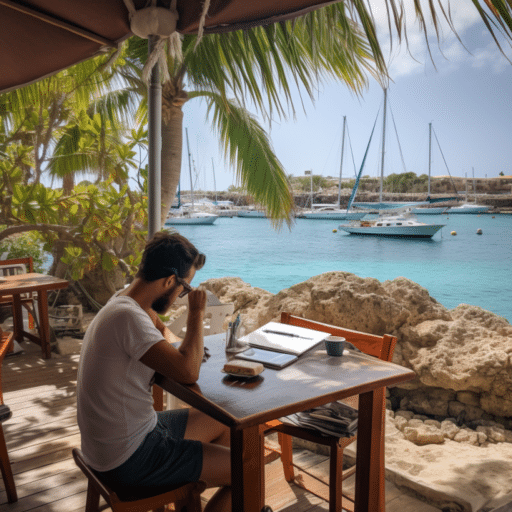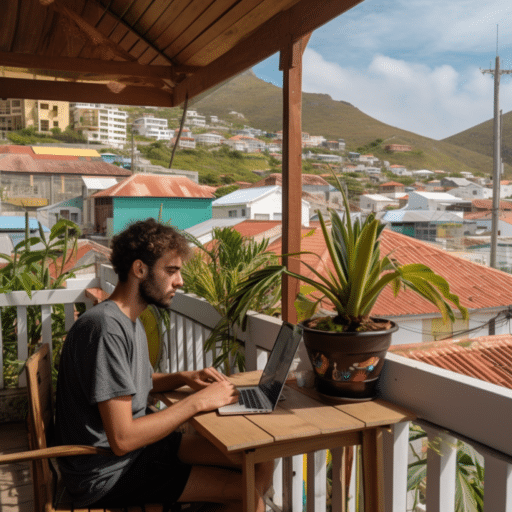When it comes to relocating, Bonaire, St Eustatius, and Saba offer enticing opportunities for individuals seeking a change of scenery, a slower pace of life, or a tropical paradise to call home.
With their stunning natural beauty, warm climate, and unique cultural experiences, these islands in the Caribbean are attracting an increasing number of expatriates.
However, before making the leap, it is crucial to consider the financial aspects of relocating to ensure a smooth transition and long-term financial stability.
If you have any questions or want to invest as an expat or high-net-worth individual, you can email me (advice@adamfayed.com) or use these contact options.
Cost of Living in Bonaire, St Eustatius, or Saba
When relocating to Bonaire, St. Eustatius, or Saba, it is crucial to understand the cost of living in these Caribbean islands. This section will provide valuable information about housing and rental prices, utilities, and daily expenses, as well as healthcare and insurance costs.
Housing and Rental Prices
The cost of housing in Bonaire, St Eustatius, and Saba can vary depending on factors such as location, size, and amenities.
The average monthly rent for a one-bedroom apartment in Bonaire is approximately $900 to $1,200, while a three-bedroom apartment can range from $1,400 to $1,800 per month.
In St. Eustatius and Saba, the rental prices are slightly lower, with average one-bedroom apartments ranging from $700 to $900 per month and three-bedroom apartments from $1,200 to $1,500 per month.
It’s important to note that these prices may fluctuate due to various factors, including market demand and availability. It is advisable to research current listings and consult local real estate agents for the most accurate and up-to-date information.
Renting vs. buying property
When considering accommodation options, you need to weigh the advantages and disadvantages of renting versus buying property.
Renting provides flexibility and requires less upfront investment, making it an attractive choice for those who plan to stay in the area for a shorter period. On the other hand, buying property can be a long-term investment that offers stability and potential appreciation.
Before making a decision, it is essential to consider factors such as your financial situation, long-term goals, and the real estate market conditions in Bonaire, St Eustatius, or Saba.
Conducting thorough research, seeking professional advice, and comparing rental and property prices are vital steps in making an informed choice.
Utilities and Daily Expenses
Electricity, water, and internet costs
Utilities are a necessary part of daily life, and understanding their costs is important when budgeting for your relocation.
In Bonaire, the average monthly cost for electricity ranges from $150 to $200, depending on the size of the household and usage. Water expenses typically amount to around $50 to $100 per month.
Internet services are widely available on these islands, with average monthly costs ranging from $60 to $100, depending on the internet speed and package you choose. It’s advisable to research different providers and compare their offers to find the most suitable and cost-effective option for your needs.
Grocery prices and food expenses
Grocery prices in Bonaire, St Eustatius, and Saba can be higher compared to some other regions due to their remote location. However, local markets and supermarkets offer a wide range of products to meet residents’ needs.
On average, a monthly grocery budget for a single person can range from $200 to $400, depending on dietary preferences and eating habits. It’s important to note that prices may vary depending on factors such as seasonality and imported goods.
Exploring local markets and purchasing fresh, locally sourced produce can help manage costs while enjoying the flavors of the Caribbean.
Healthcare and Insurance
When relocating to Bonaire, St Eustatius, or Saba, it’s important to have an understanding of the healthcare system and access to medical services. These islands have healthcare facilities, including hospitals, clinics, and specialized medical centers.
However, it’s worth noting that the availability of certain medical procedures or specialized treatments may be limited compared to larger metropolitan areas.
Health insurance options and costs
Health insurance is a vital consideration when relocating to ensure you have access to necessary healthcare services and financial protection.
In Bonaire, St Eustatius, and Saba, residents are required to have health insurance coverage. Private health insurance providers offer various plans, with premiums varying based on coverage and the insured person’s age and medical history.
The cost of health insurance in these islands can range from $150 to $300 per month, depending on factors such as coverage levels and the number of individuals covered.
It’s essential to carefully review insurance policies, understand the coverage and limitations, and consider your personal healthcare needs when selecting a suitable health insurance plan.
Remember, thoroughly researching the current cost of living, housing prices, utilities, and healthcare expenses in Bonaire, St Eustatius, or Saba will help you make informed financial decisions when relocating.

Employment and Income Opportunities
When relocating to Bonaire, St Eustatius, or Saba, it is essential to understand the employment and income opportunities available in these islands. This section will provide you with an overview of the job market and highlight the considerations for self-employment and entrepreneurship.
Job market overview
The job market in Bonaire, St Eustatius, and Saba is primarily driven by sectors such as tourism, hospitality, construction, and agriculture.
These islands attract tourists from around the world, leading to a demand for services in the tourism and hospitality industry, including hotels, restaurants, and recreational activities. Additionally, the construction sector is thriving due to infrastructure development and real estate projects.
The employment prospects in these islands can vary based on the specific industry and your qualifications. It is important to research and assess the demand for your skills or profession in advance.
Keep in mind that local employment regulations might prioritize hiring local residents before considering international candidates.
Self-employment and entrepreneurship
If you are considering self-employment or starting your own business, relocating to Bonaire, St Eustatius, or Saba can offer opportunities.
However, it is crucial to understand the local regulations and requirements for establishing a business. Familiarize yourself with the legal processes, permits, and licenses necessary to operate within your chosen industry.
As a self-employed individual, it is important to plan your finances carefully. Consider factors such as startup costs, ongoing expenses, and potential income fluctuations.
Ensure you have a solid business plan and sufficient capital to sustain your business during the initial phase.
Additionally, explore options for business loans or grants that may be available to support your entrepreneurial endeavors.
Tax Considerations
When relocating to Bonaire, St Eustatius, or Saba, understanding the tax system and associated considerations is crucial for your financial planning.
Income tax rates and thresholds
Bonaire, St Eustatius, and Saba have their own tax systems, with variations in income tax rates and thresholds. It is important to familiarize yourself with the specific tax laws of the island you are relocating to. These islands may have progressive tax rates, meaning that higher income levels are subject to higher tax rates.
VAT and other indirect taxes
Value Added Tax (VAT) and other indirect taxes may apply to certain goods and services in Bonaire, St Eustatius, or Saba. Research the local tax regulations to understand the applicable rates and which items are subject to these taxes.
Tax benefits and incentives
Bonaire, St Eustatius, and Saba may offer tax benefits or incentives for expatriates. These incentives are designed to attract skilled professionals and investors to the islands.
Consult with a tax advisor to understand if you qualify for any expat tax regimes or incentives and the potential tax savings they can provide.
If you are relocating from a country with which Bonaire, St Eustatius, or Saba has a double taxation agreement, it can help you avoid being taxed twice on the same income.
These agreements generally aim to eliminate or reduce the tax impact on individuals who have income in both their home country and their new country of residence.
Reporting requirements and compliance
As a resident of Bonaire, St Eustatius, or Saba, you will have certain reporting requirements and compliance obligations for tax purposes. Stay informed about deadlines for tax returns, declarations, and any other mandatory reporting.
Non-compliance can result in penalties or legal issues, so it is essential to fulfill your tax obligations diligently.

Banking and Financial Services
When relocating to Bonaire, St Eustatius, or Saba, it is crucial to understand the available banking and financial services in order to manage your funds effectively.
Banking options
There are several banking options to consider when relocating to Bonaire, St Eustatius, or Saba. These islands have both local banks and branches of international financial institutions, offering a range of services to meet your banking needs.
Some well-known local banks include [mention bank names] while international institutions like [mention banks] also have a presence in the region. It is important to research and compare the services, fees, and convenience offered by different banks to choose the one that suits you best.
When you arrive at your destination, opening a bank account is a crucial step to manage your finances effectively.
To open a bank account, you will typically need to provide identification documents such as your passport, proof of address, and sometimes a reference from your previous bank.
Local banks often offer a variety of account types, including savings accounts, checking accounts, and investment accounts, which cater to different financial needs.
Ensure that you inquire about any specific requirements or documents needed to open an account at your chosen bank.
Currency exchange and money transfers
Currency exchange is an important aspect to consider when relocating to a new country. Bonaire, St Eustatius, and Saba use the US dollar (USD) as their official currency.
This eliminates the need for immediate currency conversion if you are coming from a country that also uses the USD. However, if you hold a different currency, you will need to exchange it for USD.
It is advisable to compare exchange rates and fees offered by different banks and exchange bureaus to get the best deal. Be aware that some institutions may charge higher fees for currency conversion.
Additionally, consider using reputable exchange services or withdrawing money from ATMs affiliated with your bank to minimize fees.
Transferring funds internationally may be necessary for various reasons, such as supporting family members, paying bills, or managing investments.
When making international money transfers, it is essential to understand the associated fees and exchange rates.
Banks and specialized transfer services like Wise or Western Union offer different options for transferring funds. Compare the fees, exchange rates, and transfer times to find the most cost-effective and efficient solution for your needs.
Retirement Planning and Pension Systems
Planning for retirement is a crucial aspect of your financial journey, regardless of your location. When relocating to Bonaire, St Eustatius, or Saba, it is essential to understand the retirement options and pension systems available.
Retirement options and programs
The islands of Bonaire, St Eustatius, and Saba have their own pension systems designed to provide income and financial security during retirement. These systems typically consist of national pension schemes and private pension plans.
The national pension schemes aim to ensure a basic level of income for retirees. Specific details of these schemes may vary among the islands, so it is important to research the local regulations and requirements.
These schemes are generally funded through contributions made by employees and employers during their working years.
Apart from the national pension schemes, private pension plans, and investments are an additional option for building a more substantial retirement fund.
Private pension plans can be offered by banks, insurance companies, or other financial institutions. These plans allow individuals to make regular contributions toward their retirement and benefit from potential investment growth.
Social security agreements
Social security agreements, if applicable, can have implications for expatriates relocating to Bonaire, St Eustatius, or Saba.
These agreements are bilateral agreements between countries that aim to protect the social security rights of individuals who have worked in multiple countries. They may cover various aspects, such as pension entitlements, healthcare coverage, and eligibility for certain benefits.
When relocating, it is essential to understand the social security agreements in place between your home country and Bonaire, St Eustatius, or Saba.
This understanding will help you determine how your social security contributions and benefits will be affected by the move.
Eligibility criteria and claiming procedures may differ depending on the specific agreement, so it is advisable to seek professional advice or consult the relevant authorities for accurate information.

Real Estate and Property Investment
When relocating to Bonaire, St Eustatius, or Saba, one of the key considerations is the real estate market and property investment opportunities in these Caribbean islands.
Whether you are looking to buy a property or explore the option of renting out your existing property, understanding the legal requirements, market trends, and property management tips is essential for a successful relocation.
Buying property in Bonaire, St. Eustatius, or Saba
Before purchasing a property, it is important to familiarize yourself with the legal requirements and procedures in the specific island you are relocating to.
Each island has its own regulations and processes for property acquisition. Engaging a local real estate agent or lawyer who specializes in the region can help navigate through the intricacies of the local property laws, title searches, and documentation needed for a smooth purchase transaction.
Additionally, non-residents may have certain restrictions or requirements when it comes to property ownership, so be sure to clarify these regulations.
Real estate market trends and considerations
The real estate market in Bonaire, St Eustatius, and Saba has experienced steady growth in recent years.
However, it is important to note that these islands are relatively small and may have limited property availability compared to larger destinations. Prices for properties vary depending on factors such as location, size, and amenities.
Conduct thorough market research to understand current property prices, market trends, and the potential for future appreciation. Keep in mind that property values can be influenced by factors like tourism, infrastructure development, and the overall economic climate of the region.
Renting out property
If you own a property in Bonaire, St Eustatius, or Saba and are considering renting it out, it is important to assess the rental market dynamics.
The demand for rental properties can vary based on factors such as location, amenities, and the type of property.
Research the local rental market to understand rental rates, vacancy rates, and the types of properties that are in demand. Engaging a reputable property management company can help you navigate the rental market and find suitable tenants for your property.
Education and Childcare
When relocating to Bonaire, St Eustatius, or Saba with children, it is crucial to consider the education and childcare options available on the islands.
Understanding the schooling options, language of instruction, and curriculum, as well as the availability and quality of childcare facilities, can help you make informed decisions for your children’s education and well-being.
Schooling options
- Public and private schools: Bonaire, St Eustatius, and Saba have both public and private schools that cater to different educational needs. Public schools are government-funded and generally follow the local curriculum. Private schools, on the other hand, may offer alternative curricula, such as international or Montessori programs. Research the available options, their academic standards, extracurricular activities, and admission requirements to determine the best fit for your child.
- Language of instruction and curriculum: The language of instruction in schools can vary depending on the island. While Dutch is the official language, English is commonly spoken and used in educational settings. The curriculum typically follows the guidelines set by the Ministry of Education of the Netherlands. Consider the language requirements and curriculum alignment with your child’s educational goals when choosing a school.
Childcare facilities and costs
Bonaire, St Eustatius, and Saba offer various childcare facilities and services to support working parents. These include daycare centers, preschools, and after-school programs.
Research the availability of these services in your desired location, and inquire about their operating hours, staff-to-child ratios, and safety measures. It is advisable to visit the facilities and speak with other parents to assess the quality of care provided.
Depending on your financial situation and residency status, you may be eligible for subsidies or financial assistance programs to offset childcare costs.
Explore the options available through local government programs or employers to determine if you qualify and how to apply for such support.
Conclusion
In conclusion, relocating to Bonaire, St Eustatius, or Saba presents exciting opportunities and a chance for a fresh start. However, it is crucial to pay close attention to the financial aspects of your move.
By developing a solid financial plan, assessing your income and expenses, setting clear financial goals, creating a budget, and implementing saving and investing strategies, you can set yourself up for a successful relocation.
To ensure a smooth transition, research and gather as much information as possible about the specific financial considerations relevant to your move. Seek professional advice when needed, consult with local experts, and stay proactive in managing your finances.
Remember, financial planning is an ongoing process, so regularly review and adjust your strategies as circumstances change.
Pained by financial indecision?

Adam is an internationally recognised author on financial matters with over 830million answer views on Quora, a widely sold book on Amazon, and a contributor on Forbes.



